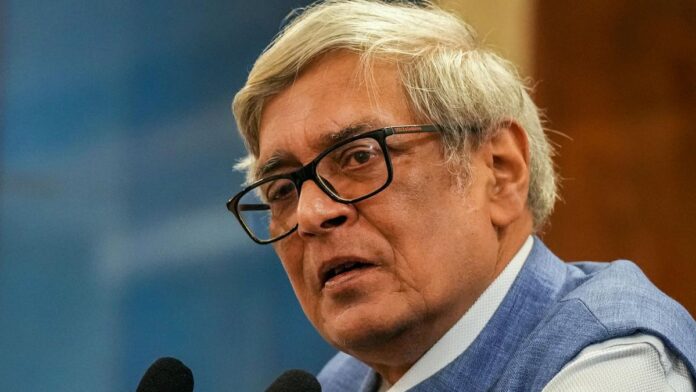
File picture of Bibek Debroy, chairman, Economic Advisory Council to the Prime Minster
| Photo Credit: PTI
Noted author and economist Bibek Debroy, who had been the Prime Minister’s Economic Advisory Council Chairman since 2017, passed away on Friday (November 1, 2024) at the age of 69.
Mr. Debroy was also a member of the Niti Aayog, which had replaced the erstwhile Planning Commission, till mid-2019, and had wide-ranging interests beyond economics. He was also a Sanskrit scholar who had translated the Bhagavad Gita, the Vedas, the Ramayana and the Mahabharata into English; and was working on a project to translate the Puranas as well that remained incomplete.
The veteran economist, who had been ailing for a few weeks, had been admitted to the AIIMS emergency around 10 p.m. on Thursday. Hospital sources said he had “subacute intestinal obstruction” and expired at 7 a.m. on Friday. Political leaders across the political spectrum paid lofty tributes to Mr. Debroy, with Prime Minister Narendra Modi Modi condoling his demise by stating that “he left an indelible mark on India’s intellectual landscape”.
“Dr. Bibek Debroy Ji was a towering scholar, well-versed in diverse domains like economics, history, culture, politics, spirituality and more. Through his works, he left an indelible mark on India’s intellectual landscape. Beyond his contributions to public policy, he enjoyed working on our ancient texts, making them accessible to the youth,” wrote Mr. Modi on X.
Congress leader Jairam Ramesh called Mr. Debroy “a man of unusually wide-ranging interests” who was “first and foremost a fine theoretical and empirical economist who worked and wrote on various aspects of the Indian economy”.
President Droupadi Murmu said the country had lost an eminent public intellectual and termed Mr. Debroy’s understanding of India’s social, cultural and economic landscape as “exceptional”.
Finance Minister Nirmala Sitharaman noted that Mr. Debroy “profusely participated in policy making”. “His interests, inter alia, were — ancient texts, Vedic and classical Sanskrit, Devi, Railways. He was prolific in translating Sanskrit to English — our epics and puranas. His book Sarama and Her Children showed his uncanny knack in extracting nuggets from our ancient texts. Bibek, you had so much more to do and to complete — for all our sake!” wrote Ms. Sitharaman.
Warm, affable and erudite, Mr. Debroy remained a prolific author and columnist even after joining the Niti Aayog, continuing to shed light on an eclectic variety of issues, including but not restricted to arcane and archaic legislations, and the Indian Railways’ history and operational nuances. In his recent public speeches, Mr. Debroy had mooted the need for the country to expeditiously conduct the population Census that has been overdue for a few years, and to revisit key economic metrics, including the poverty line definition.
Early years and career
After his schooling at Ramakrishna Mission School, Narendrapur, Mr. Debroy had studied at Presidency College, Kolkata, followed by the Delhi School of Economics and Trinity College, Cambridge. Starting with a teaching stint at his alma mater Presidency College, Mr. Debroy had worked at the Gokhale Institute of Economics and Politics in Pune, followed by the Indian Institute of Foreign Trade in the national capital.
The economist also spent a year with the Department of Economic Affairs in the Finance Ministry in the mid-1990s, but one of his longest serving roles was the directorship of the Rajiv Gandhi Institute for Contemporary Studies (RGICS) between 1997 and 2005.
At RGICS, the think tank affiliated with the Rajiv Gandhi Foundation, a report, steered by Mr. Debroy and published in 2005, had created a flutter in the first year of the Manmohan Singh-led UPA regime by naming Gujarat, then under Chief Minister Narendra Modi, as India’s top State on an index to measure economic freedom.
This had led to a protracted and heated debate on the Gujarat model of development, and amid unease in the Congress ranks over the report, Mr. Debroy eventually moved on to the Punjab Haryana Delhi Chamber of Commerce and Industry or PHDCCI. A two-year stint at the industry body was followed by a long stint at the Centre for Policy and Research from 2007 till he became part of the Centre’s think tank after Mr. Modi’s government assumed office in 2014.
Noted author and economist Bibek Debroy no more
Mr. Ramesh recalled that Mr. Debroy had a special skill for lucid exposition that would make laypersons easily understand complex economic issues. “Bibek was also a very prolific, and always thought-provoking, commentator in the media on public issues going well beyond economics. More than that, he will be remembered as a genuine Sanskritist of great erudition,” Mr. Ramesh said, pointing to his translations of some important late 19th century essays in Bengali as “noteworthy”. “He will be missed for his scholarship as well for his dry sense of humour,” he summed up.
(With inputs from Bindu Shajan Perappadan)
Published – November 01, 2024 11:07 am IST
